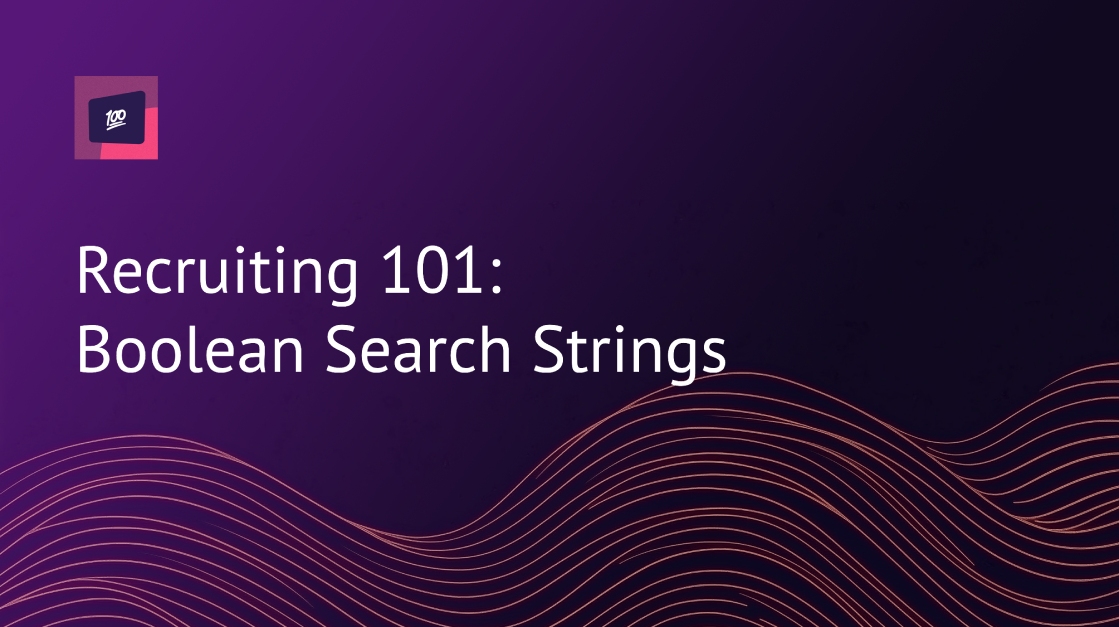Recruiting 101: Boolean Search Strings

It would be great if great candidates for vacancies in the company fell from the sky like ripe apples. But until this happens, the search for new employees is an exciting but complex process.
Experienced recruiters themselves look for excellent candidates and not just take responses from LinkedIn. For some positions, it is not enough to post a vacancy and wait for a suitable candidate to be found. Conducting a "cold" search is essential to finding a worthwhile specialist.
the best candidates faster



Professionals are looking not only on popular job sites. They actively use new search methods and specialized sites and services. Many in-demand specialists, such as developers or editors, do not keep resumes on the usual job sites. Therefore, to find them, you have to try.
When selecting candidates for complex positions of qualified specialists and managers, we often encounter the fact that there are very few suitable candidates on job sites, and there are practically no relevant responses to the vacancy. Professional recruiters face this problem every day, especially when it comes to finding programmers and other IT professionals. This problem can be solved by such a tool of a modern recruiter as a boolean search. The article will be helpful to those who are engaged in the search and hiring of new employees and want to improve this process.
What is a boolean search?
Boolean search in Google using certain analytical operators. You can go through comprehensive data and get the appropriate effects.
It is generally accepted that boolean queries are used only when all the classic methods have failed (job sites, social networks, recommendations, etc.). However, this statement is valid until you realize the true power of the tool. Boolean queries support you to get the best out of every query, and operating it is not as difficult as it can appear at first.
This is a search on Google or Yahoo using particular operator words: "AND," "OR," "site:" etc. If you write search queries in a certain way and use operators, you can find specialists on social networks, on sites with resumes, on profile portals, and even in Google documents with open access.
Internal search on Facebook or Behance doesn't work very well, and it's hard to find the right candidate. But if you use boolean search, you can get more relevant results.
How to use boolean search strings?
Boolean search is founded on analytical phrases and signs:
- AND
- OR "|"
- "+" "-"
- site:
- inurl:
- filetype:
- title:
- intext:
The many widespread boolean strings are the passage "". It includes the term or even phrase we like to discover on the page. You can explore for any specified duration using the OR string, and AND permits you to get runners in the result with a couple of selected words- or vice versa - without comments.
Boolean search strings examples
For illustration, we need an experienced programmer (middle programmer) who can operate with three server-side programming languages: PHP, Perl, and C++. This is how the boolean request will look like:
(PHP OR Perl OR C++) AND middle programmer resume
We inform the search engine that we need to discover runners that contain at least one of the three words (PHP, Perl, C++) and the expression middle programmer resume.
The selected proposal is our basis. If you google it right now, it will find more than 18.4 million outcomes, which do not seem to be specific yet. We need to construct our question until we reach the expected effect slowly. Sooner, let's define our geographic location. Add site: com at the end of the submission (if in the USA).
(PHP OR Perl OR C++) AND middle programmer summary site: com
Now we have 247 thousand results.
We count it as the primary word if we must define ourselves as a detailed city.
(PHP OR Perl OR C++) AND middle programmer resume New Your site: com
And we already have 44,000 pages in the SERP. This is something you can start operating with.
By ruin, when administering a search, the robot checks the entire page, and the explored terms can be found someplace in different blocks (for example, "Most useful vacancies" or "Fast vacancies"). To save ourselves from illegal distribution, add the operator: intitle. It describes the search engine to just looking for companions in the header of the pages.
intitle: (PHP OR Perl OR C++) AND middle programmer New York summary site: com
The issuance was lowered to 19,800 runners. We are bringing nearer to the destination. The penultimate phase will be the diversification of the hunt for specific sites.
intitle:(PHP OR Perl OR C++) AND middle programmer New York summary (site:indeed.com)
Remaining: 3760 pages.
And the last communication is the screening of all newbies or intermediate specialists. We add a minus operator to the request - and show which words we do not want to see in the headers. At this point, the senior:
intitle: (PHP OR Perl OR C++) AND middle programmer summary New York -senior (site:indeed.com)
So with simply one submission, we create a mask of Google that will accumulate emptiness.
Remark that you can't set limitations on the serial period for boolean searches, but Google will do that for you by displaying the most current outcomes first. You can establish a different term in the "Tools" tab. We usually choose a week in advancement, and if we don't find anything, we expand it to a month.
Necessary! The boolean query cannot transcend 32 words, so it's better to decide on the critical parameters.
Constantly, all boolean operators are executed on the "Advanced Search" page in Google. Nevertheless, the ability to make requests will not harm you since the operators work on LinkedIn and Facebook, which are occasionally impossible to work with straight from Google.
Constantly try to keep your request as specific and straightforward as possible. We attempted to use all the operators in the example, but the question can be halved and get an identical outcome. It is unbelievable to enter the correct request immediately. Form the basis, then filter out disproportionate issuance.
Ten best boolean search strings
Here is the list with the most frequent boolean searches for Google.
- Search for the exact phrase ""
- An operator that combines words or expressions in a search query - AND
- Search for any of the words - OR
- The operator that sets the priority of a part of a search query - ( )
- Excluding a word from search results - -
- Limit on the word in the title of the page - intitle:
- Restriction on a specific site - site:
- URL restriction. The search is limited to a group of pages whose URL contains the given inurl fragment: inurl:
- Search with a missing word, part of a word (Can also be used for missing URL elements) - *
- File Type Restriction: PDF DOC or DOC_X (MS Word), PPT (MS PowerPoint), XLS (MS Excel), RTF - filetype:
Why is boolean search important for recruiters?
It is clear why a boolean search is a good idea for recruiting technical talents. Here are some justifications for using this kind of technical search for hiring:
Save time.
Use these operators and the appropriate keywords in your search queries, and you'll be able to construct an influential list of search strings instantly. This will save you time in developing your analysis and screening your results. What's better, you can bring activity faster by spending less time reviewing each resume. The moment spent planning keywords to find superb technical skills in a candidate will pay off when you can find the right developer for you.
More control.
When searching for a designer with technological skills, boolean strings can be convenient and give you more authority over search results. Appropriate Boolean search can make your job more comfortable and provide more precise and observant results. We consider this technical search tool a search management magician that has made my life much more accessible and delivered you better control over your keyword searches.
It reduced contender CVs.
With a boolean hunt, you keep the correct technique to find a designer with the appropriate skill set, determining the inquiry to suitable profiles. As a result, you will expend less period searching for the right person with skills, so you will have enough time to communicate with important people.
An amazing topic for discussion.
Unlike orthodox methods of technical recruitment, you can change the environment by including the topic of a Boolean search when interacting with the candidate. This meeting may open them up, as analysis shows that candidates are more receptive to recruiters or supervisors willing to learn.
Conclusion
Try applying these statements the next time you search for a team member. More accurate queries reduce search time and weed out unnecessary results. Boolean search strings for recruiters are a modern and fundamental instrument if you want to hire a great specialist. Just one minute to write the proper request will ensure that your request is correctly interpreted, and you will receive the best results in the search for candidates.
the best candidates faster




